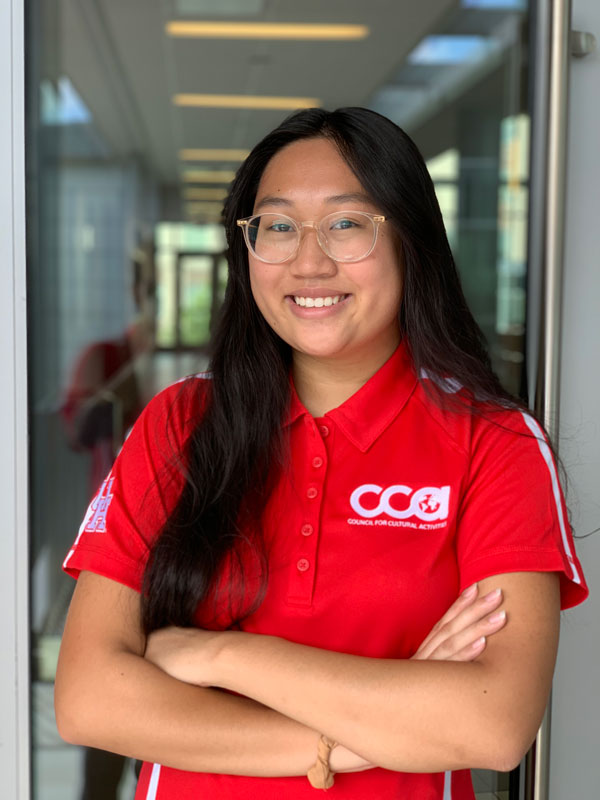DSAES News
July 21, 2022
Clare Dunning found online learning to be a challenge. Before COVID-19 fundamentally changed the world, the electrical engineering major spent a lot of time on campus with friends, studying at the library or hanging out at the Student Centers.
“I felt a lot more productive going out of my apartment and having a special place to study specifically and knowing I had a place I would go out and throw a frisbee with my friends between classes to relax,” Dunning said. “Now I only go to campus to work, I can’t go out and see my friends, and practices for sports clubs are not the same as before.”
It’s been just over a year since the University of Houston went to online-only operations because of the global pandemic, and a return to a more normal campus experience may still be months away. The Division of Student Affairs and Enrollment Services — and its 29 departments — have spent the past year translating in-person programs and services to a virtual and remote experience.
But how well did we do?
Students tell us many transitions to remote services went well. Others still need some work. And some should stick around even after we are all back on campus.

Christian Glover
“I think there’s going to be a substantial amount of people who still choose remote services,” said Christian Glover, a Houston native enrolled in the Bauer School of Business. “Involvement, organization, fitness, and mental health services should still be up and running even when a majority are back to in person learning. I think having the choice to choose online will be beneficial especially to those who are overwhelmed returning to campus.”
When UH went online only in March 2020, the departments in DSAES used a lot of quick thinking, creativity, online programs, social media, and new technology to shift to virtual operations, and they have continued to do so as UH continues its hybrid remote/in-person learning approach.
From counseling services to career fairs to recreational sports, the mission was the same: Keep students entertained, engaged, involved, and healthy.
Both Counseling and Psychological Services and the Student Health Center’s Psychiatry Department began offering sessions via virtual means, and the telepsychiatry option became so popular that it will remain even once life on campus returns to normal.
Unable to hold in-person career fairs, University Career Services took advantage of the Microsoft Teams software made available by the university and created an all-new way to connect employers with students — virtually. They were so successful at holding virtual career fairs that they have even taught other universities and colleges how to do it.
Campus Recreation may have been closed for in-person activities, but that did not mean students couldn’t still work out. When its facilities closed in March 2020, Campus Rec took much of its programming online: It began offering on-demand fitness, live-streamed group fitness classes on social media, offered socially distanced fitness challenges, and even an eSports competition. In addition, when it came time to reopen the facility, Campus Rec spent weeks adapting policies, training workers, and reengineering the space so students could work out safely.
Other departments set up Discord servers, began hosting events via Zoom, or developed web-based resources like CSI On Demand. Some even shifted entire conferences to an online-only format, including the Empower Women’s Leadership Program through the Women and Gender Resource Center.

Tammy Thach
Tammy Thach, who is majoring in marketing and management and is the director of the Council for Cultural Activities at UH, took advantage of many of the remote services offered through DSAES departments, including attending the Center for Diversity and Inclusion’s Diversity 101 program, the Empower conference, and virtual fairs held by CSI and the Parent and Family Program.
Overall, Thach said, she was impressed by the various ways departments continued to connect and engage with students remotely and found that many were “first-rate in transitioning to remote operations.”
“I hope that as UH transitions back to regular operations that some services will continue to be offered remotely,” she said. “I especially enjoyed the Empower Women's Leadership Conference and the ‘Because I Said I Would’ event due to its accessibility and the experience I gained from the events.”
So what else worked well?
Thach, who graduates in May, said she noticed many departments demonstrated adaptability and flexibility with remote services. “What I've noticed this year is an increase and creativity in social engagement from DSAES departments,” she said. “For example, when the Center for Diversity and Inclusion and UH Wellness hosted Instagram Live sessions on Instagram. It was a great opportunity to see the departments engage with students in this new way.”
Glover, who anticipates graduating in 2023 and is the UH Men’s Rugby President, appreciated the ongoing communications from departments for the services. Campus Recreation, he said, “did a great job making sure all the sports clubs were taken care of, especially in the fall semester. UH Wellness also stood out in their effort to take care of UH students and their pursuit of an education. I appreciate that UH is a very realistic school.”
Dunning, who also works in Campus Recreation and is also the UH Women’s Ultimate President, did her return to work training online this past summer. She found the training to be thorough and well prepared, and appreciates their efforts to offer virtual workouts to keep people at home active with an online support group.
What do students want to keep?
Based on student interviews and feedback from students, not only do Coogs want to keep teletherapy, but also some other services that offered convenience — and not just because COVID-19 forced it to go remote.
“The options for having virtual meetings has brought a strong convenience to my life as a student,” Dunning said. “Not having the need to go out to campus to talk about something real quick with a professor or counselor has been a great option that I have been using frequently this year. I have gone to office hours more this semester than I did all of last year because it is not too out of my way. I think that when things are ‘normal’ again that keeping video calls as a normal option for meetings will be good for students and staff.”
Thach wants the virtual involvement fair to stay online, as well as Cat’s Back. “It was a great alternative to meet potential club members and was accessible for attendees,” she said.
What could be made better?
As UH — and DSAES departments — literally created virtual programs where none had existed before, there were some unsurprising stumbles.
Glover said it did sometimes feel difficult to stay involved with other clubs, including recruiting new members and engaging in virtual events.
“Something that could have been improved was maintaining student involvement throughout the programs as I feel that many students tried once and didn’t return,” Glover said. “Getting students to constantly return seems to be one of the biggest challenges of the university, at least from what I’ve seen personally, but the efforts to provide all these services online never left me feeling astray.”
Thach said her biggest hurdles were technical issues, “but that is bound to happen in an online environment.”
Dunning attended two virtual career fairs held by another part of UH, and she appreciated that they put together a way for students to connect with employers. Feedback from students to University Career Services showed many students enjoyed their virtual fairs put on through Microsoft Teams, but Dunning was left feeling disappointed by the ones she attended that UCS did not host. She spent a long time in a queue to talk to employers, only to lose her place in line and having to start over, for instance.
“All of the issues I experienced would only occur in an online setting, which was really frustrating to spend multiple hours of my day trying to find career opportunities to have multiple technical issues leaving me feeling disappointed,” she said.
An in-person career fair, Dunning said, is still superior to an online one.
Despite the numerous virtual offerings from not only DSAES but UH as a whole, Dunning, for one, is eager to return to campus when it’s safe.
“I find that having the remote services has been helpful, but nothing online will replace the true campus life and college experience I had before COVID,” Dunning said. “I have never had so many opportunities to connect with people online, but still feel so alone at the end of the day.”
DSAES Remote by the numbers, 2020
-
2,146 Student Health appointments via telehealth
-
856 Counseling appointments via telepsychology
-
38,549 Participants in Camps Rec’s virtual programs (rec sports, group fitness, personal training, etc.)
-
10,275 Requests for assistance processed by the International Student Scholar Services Office from May 9-July 17, 2020
-
10,000+ Number of students who completed virtual orientation during remote operations
-
5,001 Virtual appointments completed by Admissions, the Office of the University Registrar, Student Business Services, and Scholarships and Financial Aid
-
26,922 Website Views on Center for Student Involvement Events and Resources
-
1,352 Students at Virtual Organization Fairs
-
154 New On-Demand Center for Student Involvement Virtual Resources